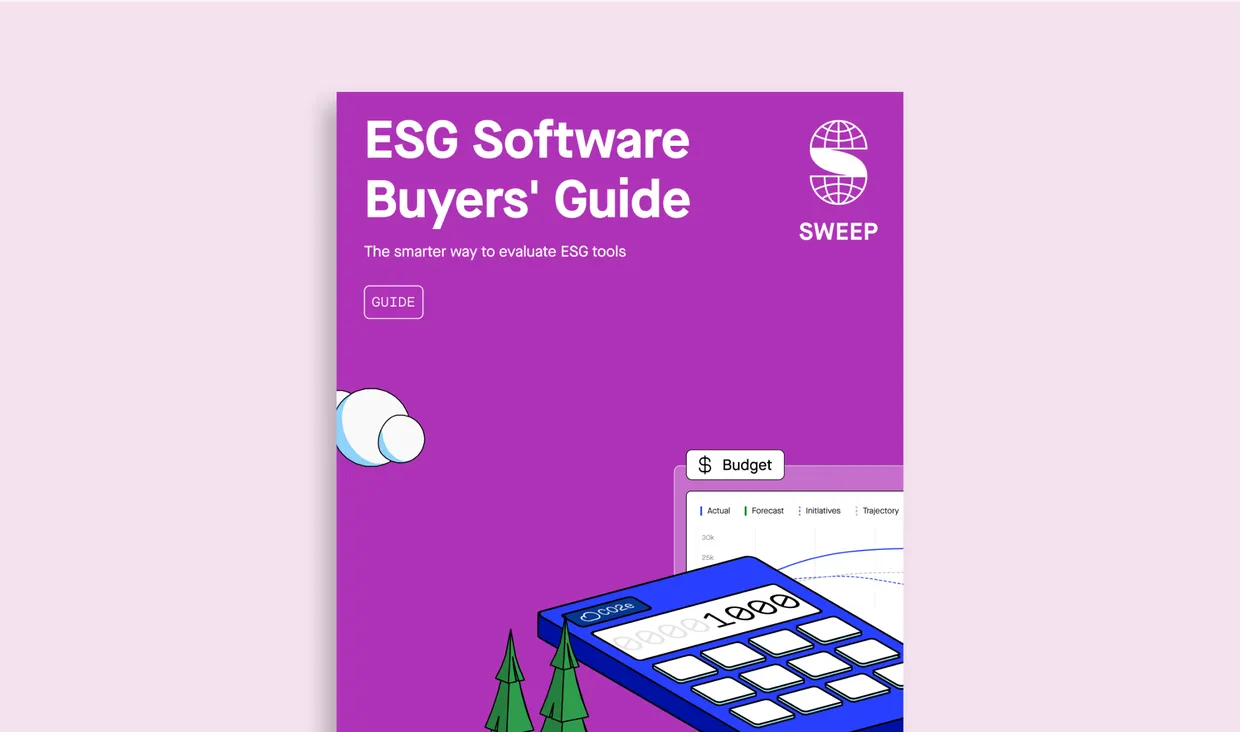Here are ten leading ESG reporting software platforms to keep an eye on in 2024:
Overview: Sweep is a leading platform that leverages AI to streamline the collection, management, and reporting of sustainability data for businesses and financial institutions of all sizes. It simplifies processes for compliance with major ESG frameworks and enhances transparency in ESG practices.
Sweep’s position as a world-leading sustainability data management software has been further cemented in the latest report by IDC MarketScape – highlighting its flexibility, robust data management, secure data ingestion, and capabilities within goal-setting and monitoring, and supplier engagement.
Key features: Sweep offers simplified data collection and reporting tools, customizable surveys for accuracy, and tools to track emissions and supply chain compliance. It provides a clear overview of progress towards targets and ensures adherence to frameworks like CSRD and SFDR.
Top clients: L’Oreal, Mano Mano, SNCF, Burberry.
Overview: Workiva is a cloud-based platform designed to support comprehensive ESG data management. It provides tools for collaboration and audit trails, helping mitigate risks and improve productivity.
Key features: Workiva supports various types of reports, including financial and ESG disclosures, with pre-built frameworks and standards. It is particularly valuable for finance, accounting, and sustainability professionals needing efficient reporting solutions.
Top clients: Tom Tom, Asics, Oatly, Telefonica.
Overview: Greenly is a centralized ESG performance platform focused on helping businesses measure and reduce their CO2 emissions. It features tools for real-time monitoring, setting reduction targets, and simplifying ESG reporting capabilities.
Key features: Greenly integrates physical and monetary flows for audit-ready data, monitors greenhouse gas emissions in real-time, and offers personalized dashboards. It also facilitates team collaboration in the decarbonization journey.
Top clients: Axa, Tripadvisor, Givenchy, Pernod Ricard.
Overview: Persefoni utilizes AI to provide a comprehensive solution for carbon management and, ESG reporting solutions. It assists businesses in measuring their carbon footprint, developing an ESG strategy, and complying with emissions reporting standards.
Key features: Persefoni offers AI-powered carbon management, regulatory and investor emissions reporting, and comprehensive Scope 3 supplier engagement. Its platform supports the development of decarbonization strategies and comprehensive emissions tracking.
Top clients: The New York Times, Xerox, Snowflake, FAIRE.
Overview: Watershed is a platform dedicated to helping companies measure, report, and reduce their carbon footprints. It offers detailed insights and supports alignment with global climate goals, such as those set by the Paris Agreement.
Key features: Watershed facilitates easy emissions data collection, provides emissions reduction planning and strategy development, and ensures data collection from various sources for comprehensive reporting.
Top clients: FeDex, Bain Capital, Spotify, airbnb.
Overview: SustainIQ is a sustainability management software, allowing businesses to centralize and manage their environmental, social and corporate governance data. It supports both automated and manual data capture.
Key features: SustainIQ offers real-time reporting, automation and bulk data uploads, and comprehensive analysis across multiple ESG factors. It is designed to streamline the management and reporting of ESG data.
Top clients: ODGroup, Fibrus, Aberdeenshire Council.
Overview: Benchmark Gensuite combines ESG reporting with environmental, health, safety (EHS), and operational risk management. It features advanced technology and AI solutions for real-time data analysis.
Key features: Gensuite provides comprehensive ESG reporting integrated with EHS and risk management, advanced AI solutions for real-time analysis, and customizable dashboards for improved visibility.
Top clients: Organizations looking for an integrated platform for managing EHS, quality, risk, compliance, and ESG data.
Overview: Microsoft Sustainability Cloud offers a suite of ESG capabilities designed to accelerate sustainability progress. It integrates carbon accounting data across value chains and supports data governance.
Key features: The platform provides data intelligence, improves audit trails and workflow management, and enables accurate, timely sustainability reporting.
Top clients: Group Bimbo, Ingredient, FLSmidth.
Overview: IBM’s Environmental Intelligence Suite combines climate and environmental data with advanced analytics. It provides in-depth insights into environmental risks and carbon emissions.
Key features: The suite includes comprehensive carbon accounting, projections of future carbon emissions, and biomass estimation for assessing deforestation impact.
Top clients: Sheltair Aviation, Agrilife, Plan 21, Shell.
Overview: Normative offers a comprehensive carbon accounting platform designed to help companies achieve net-zero emissions. It supports capturing, modeling, and reporting carbon data.
Key features: Normative provides enhanced visibility into Scope 3 emissions, support for small suppliers with a free carbon calculator, and collaboration tools for emission reduction planning.
Top clients: Hertz, Nordea, Topps Tiles, Flying Tiger Copenhagen, Hitachi.
What should you check for when selecting ESG software?
Here’s what to look for when selecting the right ESG software to ensure it meets your organization’s needs and drives effective sustainability management.
Key capabilities and flexibility
When evaluating ESG software, assess its key capabilities and flexibility first. The software should be equipped with advanced features tailored to your specific needs, such as real-time data monitoring, risk management, and scenario analysis. Flexibility is crucial as ESG reporting requirements continually evolve.
Ensure that the software can adapt to new regulations and standards, scaling with your organization’s growth and changing ESG objectives. This ensures that you have the tools and insights needed to navigate a dynamic regulatory landscape effectively.
Comprehensive ESG management
Comprehensive coverage of all your ESG data is another essential factor to consider. The software should be capable of handling a wide range of environmental, social, and governance metrics, ensuring that every aspect of your ESG performance is captured accurately.
Look for ESG reporting software that integrates various data sources and provides a holistic view of your sustainability efforts. This will allow for a more complete and transparent reporting process, enabling stakeholders to gain a full understanding of your organization’s ESG impact.
Automated data collection
Efficient data collection is a key feature to evaluate when selecting ESG software. The ability to automatically gather data from diverse sources reduces manual effort and minimizes errors, leading to more accurate and timely reporting.
With automated data collection, the software streamlines the process of capturing and processing ESG information, making it easier to maintain up-to-date records and ensure compliance with reporting standards. This efficiency not only saves time but also improves the reliability of the data you report.
Data processing and integration
Effective data processing and integration are crucial for managing ESG data efficiently. The chosen software should offer robust tools for integrating data from various departments and systems, ensuring data accuracy across all ESG reports.
Seamless data integration allows for streamlined reporting by consolidating information into a unified platform. This capability helps in aligning data from different sources, such as supply chain emissions and operational metrics, to provide a comprehensive view of your ESG performance.
Streamlined reporting
Streamlined reporting features are essential for producing clear, actionable ESG reports. Look for software that provides customizable reporting templates and dashboards, enabling you to tailor reports to meet specific regulatory requirements and stakeholder needs. Streamlined reporting tools should facilitate the generation of detailed and easy-to-understand reports, reducing the complexity of ESG data and making it accessible to various audiences. This feature helps ensure that your ESG disclosures are both comprehensive and user-friendly.
Measuring the ROI of investing in ESG software
Assessing the return on investment (ROI) for ESG software involves both quantitative and qualitative measures. Quantitatively, ROI can be evaluated by looking at cost savings from streamlined data collection and reporting, reduced risk of regulatory fines, and improved operational efficiencies.
Additionally, enhanced stakeholder trust and investor confidence can translate into financial benefits, such as increased stock valuations and investment inflows. Qualitatively, ROI is measured by the software’s ability to deliver actionable insights that improve decision-making, enhance sustainability performance, and ensure alignment with evolving regulatory requirements. Ultimately, the value of ESG software is reflected in its contribution to long-term value creation, risk management, and improved corporate reputation.





